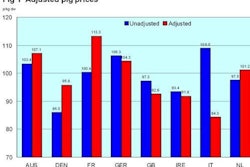Only months ago an energy independence darling, ethanol is now being blamed for global food riots, food inflation, and in-the-red balance sheets for livestock producers. For example, in explaining his company's second quarter loss of $111.4 million, Pilgrim's Pride Corp. President and CEO Clint Rivers left little doubt what he thinks is responsible: "The federal government's deeply flawed ethanol policy," which has created a crisis for his company and the entire poultry industry.
"The federal government has helped spark a growing worldwide food crisis by mandating corn-based ethanol production at the expense of affordable food. American consumers are only just beginning to feel the impact of sharply higher food prices. There will be much more to come as food producers fully pass along these higher input costs."
The impact of the largely ethanol-driven hike in grain prices on companies like Pilgrim's Pride is staggering: for the first quarter 2008, its corn and soybean meal costs rose $200 million compared to the same quarter a year ago, as the average price for corn rose 29 percent, and the price of soybean meal jumped more than 63 percent. Based on the actual costs incurred in the first half of the fiscal year and current commodity futures markets for the remainder, the company's total feed-ingredient costs for fiscal 2008 would be up more than $800 million from last fiscal year. Roughly one quarter of corn grown in the United States is used to make ethanol and for the first time in history, more corn will be used for ethanol in 2008 than the amount exported.
Not Only Livestock Producers
It's not only livestock producers calling for policy change. A chorus of state and federal lawmakers is now having second thoughts about policies they once supported. In an interview on NBC's Meet the Press, Democratic presidential candidate Barack Obama said "there's no doubt that biofuels may be contributing to falling food supplies and rising prices."
John McCain, certain to be the Republican presidential nominee, joined 23 other Republican Senators in asking the Environmental Protection Agency (EPA) to consider a waiver on ethanol mandates. "American families are feeling the strain of these food-to-fuel mandates and are growing concerned about the emerging environmental concerns of growing corn-based ethanol," the letter to EPA stated.
The United States is the world's second largest ethanol producer, behind Brazil, but opposition to ethanol is growing in Europe as well. The European Environment Agency (EEA) is recommending that the European Union (EU) abandon its target to produce 10 percent of its fuel from biofuel by 2010. Last year, ethanol production in the EU declined significantly, due to high feed prices that forced buyers to look outside of Europe for their supplies. As a result, production increased only 11 percent in 2007, compared to growth of more than 70 percent in 2005 and 2006. The EAA said it is concerned that the 10 percent target exceeds land further available without damage to the environment.
Pat Westoff, co-director of the Food and Agricultural Research Institute at the University of Missouri, says that while ethanol is "a significant factor" in rising grain prices, it is only one of many factors driving feed and food prices higher. The weak U.S. dollar, for instance, has increased exports of U.S. grain and oilseeds by making those commodities cheaper in other countries with stronger currencies. Weak crop production last year in many countries also is pressuring crop prices, he notes.
Even so, Sen. Joseph Lieberman, I-Conn., says that "it may be that the most important impact we in Congress can have is to remove these three incentives for corn-based ethanol."
 0806EIethanol
0806EIethanol


.jpg?auto=format%2Ccompress&fit=crop&h=167&q=70&w=250)














